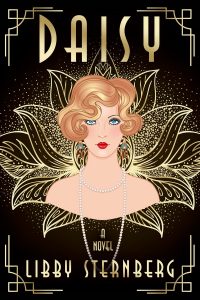Giving Daisy A Voice by Libby Sternberg
By Libby Sternberg
 If we’re going to be honest about The Great Gatsby, it’s the story of a stalker and his victim, ultimately leading to tragedy.
If we’re going to be honest about The Great Gatsby, it’s the story of a stalker and his victim, ultimately leading to tragedy.
Jay Gatsby pursues his love, Daisy Buchanan, with such single-minded focus that he ends up buying a house across from her and throws glamorous parties as bait to lure her to his abode. When that doesn’t work, he enlists the help of her cousin Nick Carraway to engineer a meeting, stuffing Nick’s cottage with flowers and food—Gatsby always overcompensates—to ultimately draw in an unsuspecting Daisy.
This is supposed to be romantic? Yet it is. Fitzgerald captures longing, sehnsucht, in such a powerful way that many who read the novel don’t remember much about its plot after their original look at the story; they just recall its…emotion.
And despite the fact that Daisy is the object of Jay Gatsby’s obsession (and an avatar for the American Dream—riches, status), her true nature remains elusive on the pages of Fitzgerald’s classic.
She’s hardly real at all, in fact.
She seems to be an expert at bon mots—she always forgets the longest day of the year, she wished for her daughter that she be a beautiful fool—but does she utter these clever phrases to welcome others into her heart or merely to charm? Is this why Jay Gatsby fell in love with her, because of her witty intelligence as well as her beauty?
Who is the flesh and blood woman Jay Gatsby could never forget?
This is what inspired me to write Daisy. When I became aware of The Great Gatsby entering the public domain, I craved to revisit the story in some way. What better way to make it fresh than to change the narrator? Daisy’s storyteller isn’t Daisy’s cousin Nick Carraway. It’s herself. It becomes her story, one that she herself tells instead of the men in the tale.
That was the first step toward making her a real woman with agency instead of an ornament or an object, to rid her of the men’s narrative and to give her one of her own.
When I sat down to put cyber pen to screen, the first line of my novel popped into my head: Nick made a lot of money off my story.
And I was off…telling the story of a woman whose life was controlled by men, whether it was implicitly or explicitly. Daisy herself had little to say about how her family’s money was spent or what she could pursue or even, as I thought about it, how her daughter might be raised.
In fact, one of Daisy’s concerns in my novel is how to keep her daughter should she run off with Jay, not a frivolous worry. For context, look up the 1934 custody case involving Gloria Vanderbilt, whose mother was portrayed as a loose woman and thus lost custody of Gloria to an aunt.
Daisy becomes more acutely aware of her restrictions as she ponders a future beyond her marriage to the boorish Tom Buchanan. She has to find ways to hoard money, a complicated affair in a day when women didn’t have their own bank accounts or handle their own finances. She has to plot how she’d survive without a man’s fortune backing her.
In my novel, she begins to grow as she faces these challenges and her ultimate decision: What kind of life does she want and with whom does she want to share it?
During the writing of this book, I reflected on the issues women still face nearly 100 years after Fitzgerald told the story of Daisy and Jay. They have greater financial and career freedom, greater choices in life in general. They’re no longer expected to stay in the home.
But they still face the condescension Daisy encountered when dealing with her husband and sometimes even with her lover. That’s the reason, I came to realize, she is so quick with the clever remark. She’s constantly trying to charm and seduce in order to get what she wants and needs.
If she speaks frankly, she is viewed as “intimidating” and “aggressive.” She can’t let her intellect shine unobstructed or she’s seen as pushy and not demure.
How many women still experience that today? How many still try to cover or reconfigure their intelligence so that it will appear more acceptable to men (and even to some other women)?
Last year, I had the opportunity to talk about these labels strong, intelligent women face—intimidating, aggressive, pushy—with a woman who leads a large organization. She’s smart and articulate. As I listed those words, she nodded her head and said, yes, she’s had them used against her in her lifetime, too.
I was shocked. This is a woman who is not only bright and thorough. She’s also kind and loving and a gentle leader of a diverse group of men and women. How could anyone think of her as anything but the caring person she is?
In that sense, Daisy’s struggle is still every woman’s struggle, to be taken seriously, to be heard.
Which is why I decided to give her a voice.
I hope Daisy entertains and inspires its readers, especially young women who wonder if they should let their light shine.
Yes, you should.
—
Libby Sternberg is the author of women’s fiction, historical fiction, romance and more. Her novel Daisy (Bancroft Press, September 2022), a refashioning of The Great Gatsby, has been hailed by Publishers Weekly’s BookLife: “The author writes with a poised composure that reads like a continuation of Fitzgerald’s prose…A delightful portrayal of a female character claiming the story as her own, repossessing her own voice.”
DAISY, Libby Sternberg
 A fresh take on classic characters, Daisy gives readers insight into Daisy Buchanan’s viewpoint of the events of F. Scott Fitzgerald’s The Great Gatsby. While simultaneously remaining true to the original and adding new information, Sternberg weaves Daisy’s perspective and Nick Carraway’s account together, correcting what Daisy knows is inaccurate from her cousin’s novel. Sternberg pulls readers in from the first page, and while the outcome of Daisy and Gatsby’s affair is universally known, readers still cannot help but root for the pair.
A fresh take on classic characters, Daisy gives readers insight into Daisy Buchanan’s viewpoint of the events of F. Scott Fitzgerald’s The Great Gatsby. While simultaneously remaining true to the original and adding new information, Sternberg weaves Daisy’s perspective and Nick Carraway’s account together, correcting what Daisy knows is inaccurate from her cousin’s novel. Sternberg pulls readers in from the first page, and while the outcome of Daisy and Gatsby’s affair is universally known, readers still cannot help but root for the pair.
As the novel progresses, the tension in Daisy’s love life heightens the stakes, and while it’s easy to want to see Daisy and Jay make it work, the reader can also feel Daisy’s ambiguous feelings about leaving her husband for Gatsby. As the story climaxes, readers are left feeling as confused as Daisy is in regard to the decisions she needs to make. While there are noticeable changes to the overall story—it is a different perspective, after all—Daisy provides readers of romantic and/or feminist fiction and fans of The Great Gatsby alike with a satisfying story that is faithful to the original, yet unique in its own right.
“The thoughts and desires of Daisy Buchanan come to the fore in this well imagined novel. This is more than a retelling of the classic from a switch in point of view. The life of a pampered and beautiful yet deeply unhappy young married woman shows the dark side of the Jazz Age in a fresh and provocative telling, marked by some real surprises.” — NANCY BILYEAU, AUTHOR OF DREAMLAND
“The author writes with a poised composure that reads like a continuation of Fitzgerald’s prose… A delightful portrayal of a female character claiming the story as her own, repossessing her own voice.” — BOOKLIFE, PW-SPONSORED FICTION CONTEST, WHERE DAISY WAS A QUARTER-FINALIST
“Daisy gives needed dimensions to the controversial Great Gatsby character, turning her from a beautiful fool into a strong woman with a life of her own.” — ERIN HURLEY, LOYOLA UNIVERSITY MARYLAND —
BUY HERE
Category: On Writing






























